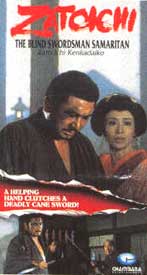 Although The Blind Swordsman Samaritan aka Zatoichi & the Drum (Zatoichi kenka daiko, 1968) has an overabundance of slapstick & seems more aimed than most at a young audience. Although The Blind Swordsman Samaritan aka Zatoichi & the Drum (Zatoichi kenka daiko, 1968) has an overabundance of slapstick & seems more aimed than most at a young audience.
We even get the comedy antics from operators of a sideshow game, commedienne Machiko Soga & comic Ryoichi Tamagawa.
Despite slapstick bits & kid appeal, this is yet a quality episode with fast, entertaining action & the usual dash of high pathos from Shintaro Katsu as Zatoichi.
He says, "When I kill someone I shouldn't, it makes everything black." Then remembering his blindness, he adds, "It's black for me anyway."
Tricked into killing a man, by gang boss Kumakichi (Akira Shimizu) who said it was for the gamblers' code. Ichi soon meets the slain young man's beautiful sister Osode (Yoshiko Mita) was the real reason the evil boss wanted the brother killed. And Ichi has put the girl in considerable danger.
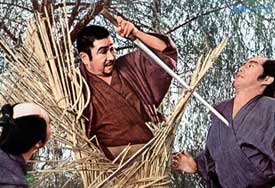 Ichi becomes her protector & the bulk of the plot, unfortunately, hinges on the incessant menacing of the heroine, & Ichi's repetitious rushing to her rescue. Ichi becomes her protector & the bulk of the plot, unfortunately, hinges on the incessant menacing of the heroine, & Ichi's repetitious rushing to her rescue.
As always, in the course of events, all the villains, & a good many of their innocuous lackeys, are killed by Ichi's sweeping blade, thereby curing all evils.
There is an element of Ichi's character revealed in this episode that is decidedly unheroic, the ease by which he is fooled into serving a bad oyabun & killing whoever he's told to kill is foremost of his several weaknesses.
Also for once we see Ichi actually cheat at gambling. He usually has a holier-than-thou attitude about cheating & his own method is commonly to let others cheat, then reveal their bad behavior to his own benefit.
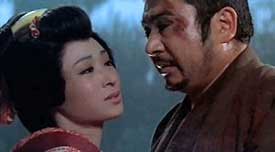 Yet in giving fellow gamblers the opportunity to cheat him so that he can take advantage of them, there's not a vast difference in his usual failure to just adhere to the games of chance as they're honestly played. Yet in giving fellow gamblers the opportunity to cheat him so that he can take advantage of them, there's not a vast difference in his usual failure to just adhere to the games of chance as they're honestly played.
So even at his "best," he's a hypocrite when it comes to honest gambling. This time, however, there's not even the holier-than-thou hypocrisy. He just cheats.
Ordinarily Ichi would rely upon his hearing & skills to win, & not seek to win with crooked dice. In this case he substitutes the phoney dice to be certain he wins back his canesword & enough money to assist Osode.
 By cheating (for a good cause at least), he wins. But his fraud is detected. It is more closely in keeping with his usual personality that he submits willingly to deserved punishment. By cheating (for a good cause at least), he wins. But his fraud is detected. It is more closely in keeping with his usual personality that he submits willingly to deserved punishment.
He is bound up in a straw mat & hauled to a river, chanting sutras most of the way, ready to die. The villains searching for Osode (to sell her to a corrupt & influential samurai magistrate) see that Ichi is about to be thrown into the river, & ask to have him so they can make him reveal Osode's whereabouts.
They kick the trussed-up Ichi, who whimsically leaps up, still bound, in the matting, & hops away like a cartoon character. He lets the villains slash close enough to cut the straw mat, thus freeing him sufficiently to fight. But he still does not have his canesword, & must fight with the hairpin Osode gave him.
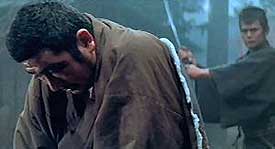 There is additionally an interesting thread to the story regarding a samurai figure, Yasaburo Kashiwazaki (Makato Sato), who wants to fight Ichi. There is additionally an interesting thread to the story regarding a samurai figure, Yasaburo Kashiwazaki (Makato Sato), who wants to fight Ichi.
This sardonic fellow is a distinct character rather than mere archetype, though we do know his eventual fate from the first moment he becomes infatuated with the notion of duelling Ichi. It is he that returns Ichi's canesword, & they promise to fight one another eventually.
Their one-on-one encounter is given as an epilog to the mass slaying of the yakuza gang. The samurai threatens Osode to give Ichi no way of evading the duel.
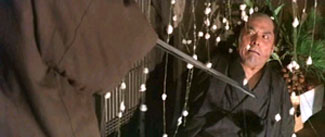 But it is New Years & festival drums pound incessantly. Ichi cannot hear his opponent's footwork & thus the final duel is protracted, impressive, with Ichi for once seeming actually liable to lose, but that the drumming stops at a critical moment. But it is New Years & festival drums pound incessantly. Ichi cannot hear his opponent's footwork & thus the final duel is protracted, impressive, with Ichi for once seeming actually liable to lose, but that the drumming stops at a critical moment.
As is often the case in the series, "winning" is not necessarily a happy ending. Ichi flees Osode who by now is in love with him.
So her freedom from prostitution does not lead her to the happy union she dreams about. Ichi fled in part because of shame regarding his own violent nature, & for that last unnecessary slaying of a skillful man, which Ichi regrets.
 In American westerns, heroes ride off into the sunset, which isn't very sensible since they're going to have to make camp at sundown having hardly gotten beyond the town limits. In American westerns, heroes ride off into the sunset, which isn't very sensible since they're going to have to make camp at sundown having hardly gotten beyond the town limits.
For many a Zatoichi adventure, it ends with his walking into the rising sun as the written characters for "The End" appear on the screen.
Not one of the strongest episodes in the series, but enough of it is grand that there's certainly no reason to skip it. There's no such thing as an actually bad Zatoichi movie.
copyright © by Paghat the Ratgirl
|
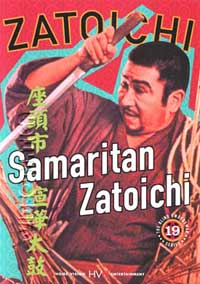

 Ichi becomes her protector & the bulk of the plot, unfortunately, hinges on the incessant menacing of the heroine, & Ichi's repetitious rushing to her rescue.
Ichi becomes her protector & the bulk of the plot, unfortunately, hinges on the incessant menacing of the heroine, & Ichi's repetitious rushing to her rescue. Yet in giving fellow gamblers the opportunity to cheat him so that he can take advantage of them, there's not a vast difference in his usual failure to just adhere to the games of chance as they're honestly played.
Yet in giving fellow gamblers the opportunity to cheat him so that he can take advantage of them, there's not a vast difference in his usual failure to just adhere to the games of chance as they're honestly played. By cheating (for a good cause at least), he wins. But his fraud is detected. It is more closely in keeping with his usual personality that he submits willingly to deserved punishment.
By cheating (for a good cause at least), he wins. But his fraud is detected. It is more closely in keeping with his usual personality that he submits willingly to deserved punishment.
 But it is New Years & festival drums pound incessantly. Ichi cannot hear his opponent's footwork & thus the final duel is protracted, impressive, with Ichi for once seeming actually liable to lose, but that the drumming stops at a critical moment.
But it is New Years & festival drums pound incessantly. Ichi cannot hear his opponent's footwork & thus the final duel is protracted, impressive, with Ichi for once seeming actually liable to lose, but that the drumming stops at a critical moment. In American westerns, heroes ride off into the sunset, which isn't very sensible since they're going to have to make camp at sundown having hardly gotten beyond the town limits.
In American westerns, heroes ride off into the sunset, which isn't very sensible since they're going to have to make camp at sundown having hardly gotten beyond the town limits.